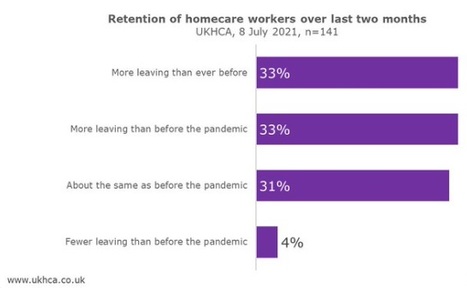More home care staff are quitting over low pay and pandemic pressures
Two thirds (66 per cent) of home care providers are experiencing more of their staff quitting their jobs than before the pandemic with low pay and Covid burnout blamed for worsening the care recruitment crisis.

Some 37 per cent of home care providers said pay and unattractive terms and conditions had the biggest impact on workforce capacity according to a poll of 140 home care providers by the United Kingdom Homecare Association (UKHCA).
Over a quarter (28 per cent) said care worker’s exhaustion from the pandemic and pandemic policies such as PPE, self-isolation, vaccination and quarantine had hurt workforce capacity.
Hiring and keeping staff is harder than before the Covid pandemic say 91 per cent of home care providers.
In addition 22 per cent of home care providers blamed competition with other businesses while 12 per cent pointed at Brexit or migration policies for their recruitment and retention issues.
The UKHCA tweeted: “Many issues affect the capacity of the homecare sector. Our survey highlights that funding (which affects both care workers’ pay, and terms & conditions of employment) has a significant impact, although competition with other business sectors & COVID are also apparent”.

Three quarters saw rising home care demand in last two months
The survey, taken on 8 July, revealed some 75 per cent said demand for home care over the last two months has increased.
To tackle the recruitment crisis, the Care Provider Alliance has published top tips for staff retention on its website.
Home care workers paid less than Real Living Wage
Low pay has been a pre-pandemic issue for the sector with home care workers across the UK being paid less than the real living wage (RLW), despite many councils’ signing a pledge to ensure care workers receive it.
Three-quarters of people polled by the Fawcett Society charity said they think home care workers should get the RLW.
But research by The Bureau of Investigative Journalism (TBIJ) found thousands of jobs advertised below £9.50 per hour in the UK or £10.85 per hour in London in 189 of the 205 councils responsible for adult social care.
Some 43 local authorities are signed up to Unison’s ethical care charter, in which they commit to paying home care workers at least the living wage. Despite this, 37 out of the 43 councils are failing to ensure the pledge is enacted. Councils’ paperwork shows some would need to find millions more in their budgets to honour the pledge.
Councils commission home care providers, paying an hourly rate from which the provider must take staff costs and other running expenses.
Each year, the UKHCA calculates what this hourly rate needs to be to allow the provider to pay the RLW to a care worker. UKHCA set a minimum price for homecare of £21.43 per hour for 2021/22, which covers the minimum legally compliant pay rate for care workers (excluding any enhancements for unsocial hours working), travel time, mileage and wage-related on-costs.
However, councils in England reported a planned average hourly rate for home care this year of just £18.49. The TBIJ discovered 94 per cent of England's local authorities were paying too little on average to allow home care providers to pass on the RLW.
Health secretary says care workers need more than just a pay rise
“Councils’ claims to reward the workforce with the real living wage without offering fees or terms to match are empty promises and pointless publicity stunts” Colin Angel, policy director at the UKHCA told the TBIJ.
In response to the investigation, Health Secretary Sajid Javid told ITV News: “Our carers have done an absolutely remarkable job, especially during this pandemic.
“I would like to see a fairer settlement for carers, and that is part of our plan on social care to have a more long-term sustainable solution.”
When asked if a fairer settlement would mean a payrise, the health secretary said: “It’s got to be more than just that.”
Latest News
 29-Jul-24
Dementia Bus gives carehome.co.uk staff insight into life with dementia
29-Jul-24
Dementia Bus gives carehome.co.uk staff insight into life with dementia
 27-Jul-23
UK's top home care agencies in 2023 revealed
27-Jul-23
UK's top home care agencies in 2023 revealed
 30-Nov-22
A quarter of older people keep their falls secret from family
30-Nov-22
A quarter of older people keep their falls secret from family
 29-Nov-22
'Covid-19 has not gone away' say terminally ill
29-Nov-22
'Covid-19 has not gone away' say terminally ill
 28-Nov-22
IT consultant who received poor care opens 'compassionate' home care business
28-Nov-22
IT consultant who received poor care opens 'compassionate' home care business